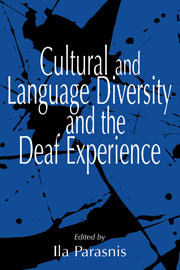Book contents
- Frontmatter
- Contents
- Preface
- PART I BILINGUALISM-BICULTURALISM AND THE DEAF EXPERIENCE: AN OVERVIEW
- PART II PSYCHOSOCIAL, COGNITIVE, AND LANGUAGE EXPERIENCES OF DEAF PEOPLE
- 5 From the Cultural to the Bicultural: The Modern Deaf Community
- 6 Early Bilingual Lives of Deaf Children
- 7 Communication Experiences of Deaf People: An Ethnographic Account
- 8 Marginality, Biculturalism, and Social Identity of Deaf People
- 9 Attitudes of the Deaf Community Toward Political Activism
- 10 Cultural and Language Diversity in the Curriculum: Toward Reflective Practice
- 11 Minority Empowerment and the Education of Deaf People
- 12 Social Assimilation of Deaf High School Students: The Role of School Environment
- PART III THE DEAF EXPERIENCE: PERSONAL REFLECTIONS
- Name Index
- Subject Index
8 - Marginality, Biculturalism, and Social Identity of Deaf People
Published online by Cambridge University Press: 05 June 2012
- Frontmatter
- Contents
- Preface
- PART I BILINGUALISM-BICULTURALISM AND THE DEAF EXPERIENCE: AN OVERVIEW
- PART II PSYCHOSOCIAL, COGNITIVE, AND LANGUAGE EXPERIENCES OF DEAF PEOPLE
- 5 From the Cultural to the Bicultural: The Modern Deaf Community
- 6 Early Bilingual Lives of Deaf Children
- 7 Communication Experiences of Deaf People: An Ethnographic Account
- 8 Marginality, Biculturalism, and Social Identity of Deaf People
- 9 Attitudes of the Deaf Community Toward Political Activism
- 10 Cultural and Language Diversity in the Curriculum: Toward Reflective Practice
- 11 Minority Empowerment and the Education of Deaf People
- 12 Social Assimilation of Deaf High School Students: The Role of School Environment
- PART III THE DEAF EXPERIENCE: PERSONAL REFLECTIONS
- Name Index
- Subject Index
Summary
The term “marginality,” is often misunderstood. It is commonly seen as a negative used to describe a person with little status and few choices who is located on the border of a group or community (e.g., Napier & Gershenfeld, 1987). With the heightened awareness of Deaf pride in recent years, attempts to discuss this concept as it might apply to deaf people is frequently enough to irritate, if not anger, members of an audience interested in deafness. Such a reaction is understandable in terms of the values and norms of the Deaf community, which will be discussed below. Yet the issues associated with marginality will not go away. During the past two years more than 40% of the essays contributed to the annual monograph of the Deaf American have contained references to or discussions of issues related to marginality (Garretson, 1992,1993). This chapter will attempt to extricate this concept from the realm of emotions and rhetoric and to show its relationship to the seemingly more popular concept of biculturalism. In turn, these ideas will be linked to issues of personal and social identity – questions such as Who am I and Where do I belong? Following this will be a discussion of “normalization and equality” as sources of social change for the Deaf community and the potential effects of these changes on the social identity of Deaf people.
Marginality and Biculturalism
As previously indicated, “marginality” is perceived by many to be a negative term used to describe someone who is not accepted and resides on the fringe of the group.
- Type
- Chapter
- Information
- Cultural and Language Diversity and the Deaf Experience , pp. 136 - 145Publisher: Cambridge University PressPrint publication year: 1996
- 7
- Cited by



